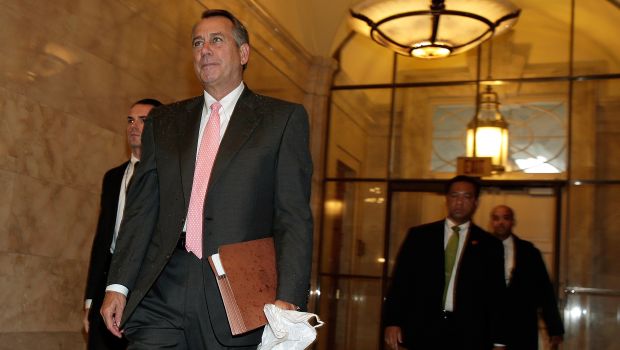
Speaker of the House John Boehner arrives at the US Capitol October 10, 2013 in Washington, DC. (Win McNamee/Getty Images/AFP)
Most economists say the default that could result from not increasing the US debt limit would deal a staggering blow to the world economy. Some Republicans have downplayed the harm a default would cause.
Boehner is slated to urge his staunchly conservative House colleagues to act before the government runs out of borrowing authority next week. The aides who spoke required anonymity to reveal the information before Boehner makes an announcement after a closed-door meeting with his Republican colleagues.
Republicans have been insistent that budget cuts and other measures be added to the so-called debt ceiling legislation but the aides wouldn’t say whether he’ll seek to add other material to the measure.
The news came ahead of President Barack Obama’s meeting with top House Republicans on Thursday as a government shutdown entered its 10th day and Obama’s treasury secretary warned that a potential default could cause “irrevocable damage” to the economy.
The US government has been partially shut down because Congress has not approved a bill to temporarily fund the government.
Separately, the government risks its first ever-default next Thursday if Congress doesn’t approve another bill, increasing the government’s borrowing authority.
Both measures are normally routine, but have become entangled in Republican demands for delaying or altering Obama’s health care overhaul and reducing government spending.
At Congress, Treasury Secretary Jacob Lew testified to the Senate Finance Committee, warning that failure to renew the government’s ability to borrow money “could be deeply damaging to the financial markets, the ongoing economic recovery and the jobs and savings of millions of Americans.”
It would also leave the government unsure of when it could make payments ranging from food aid to federal reimbursements to doctors, he said.
“The United States should not be put in a position of making such perilous choices for our economy and our citizens,” the secretary said. “There is no way of knowing the irrevocable damage such an approach would have on our economy and financial markets.”
The top Republican on the Finance panel, Senator Orrin Hatch, accused the Obama administration of “an apparent effort to whip up uncertainty in the markets.”
He and other Republicans also pressed Lew on how long a debt limit extension the president would like to see, and complained when he failed to provide specifics.
“Our view is this economy would benefit from more certainty and less brinksmanship. So the longer the period of time is, the better for the economy,” said Lew, who also repeated Obama’s willingness to accept a short-term debt limit extension for now.
The debate over increasing the debt limit—required so Treasury can borrow more money to pay the government’s bills in full and on time—already has resulted in stock market losses, spiked the interest rate for one-month Treasury bills and prompted Fidelity Investments, the largest US manager of money market mutual funds, to sell federal debt that comes due around the time the nation could hit its borrowing limit.
Obama told House Democratic loyalists Wednesday that he still would prefer a long-term increase in the nation’s USD 16.7 trillion borrowing cap but that he’s willing to sign a short-term increase to “give Boehner some time to deal with the tea party wing of his party,” said Democratic Representative Peter Welch, referring to the conservative anti-tax group.
